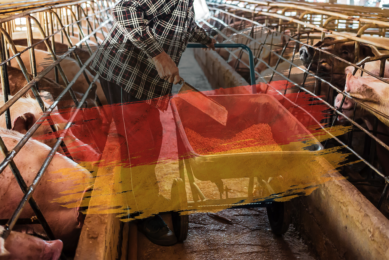Friday Feed Update: What did you miss?

All About Feed wraps up the latest updates and business developments to ensure you don’t miss a thing in the global animal feed industry.
New test opportunity for small weaners
Announcing a new service for the feed industry, namely TestPig Baby, the Danish Pig Advisory Center has almost doubled its capacity for testing of feedstuffs and feed additives.
According to sales manager Niels Ove Nielsen, small weaners are very sensitive to the nutritional quality of feed and react very quickly to changes in feed composition. The new TestPig Baby, which is based on 1,200 weaners weighing 4.1 to 6.5kg, allows testing of the gut of newly weaned pigs in a fast and cost-effective way. TestPig Baby is conducted together with the original TestPig Flex at the TestPig test station, located in the western part of Jutland, Denmark. The trials in TestPig Flex are typically based on 4,000 weaners at 6.5 to 30kg.
Since 2016, the Danish Pig Advisory Center, together with a local pig farmer, are running a test station based on approximately 1,100 sows and 39,000 weaned piglets a year.
“Our TestPig concept has proven successful when testing approved feedstuffs and feed additives under practical production conditions by the use of scientific methods,” said Mr Nielsen, adding that for the feed industry this means a higher capacity for product testing, reliable results, and the possibility of choosing the right tool for the right task”. “We have established test facilities recognised by the Danish authorities to enter product registration of feedstuffs and feed additives in Denmark and the rest of the EU,” concluded Mr Nielsen.
Nutrition Technologies to set up Southeast Asia’s largest insect protein production facility
In terms of sourcing high-grade proteins, there is growing interest in the alternative protein sector. After completing three years developing proprietary technology, in 2018 Nutrition Technologies started commercial production of protein & oil from black soldier fly larvae as a sustainable alternative to fishmeal. Now, the Singapore-based company are set to establish the largest high-tech commercial-scale insect protein production facility in Southeast Asia. The facility will produce over 18,000 tonnes of insect-based feed ingredients and organic fertilisers every year.
“The key to be successful in this sector is being able to produce a consistently high-quality product at an affordable price for feed manufacturers without charging a sustainability premium,” said Nick Piggott, co-founder and CEO of Nutrition Technologies. “We have achieved this by developing a unique combination of bio-processing steps, which enables us to optimise the nutrient uptake in our insect larvae. Coupled with the low operating costs in Southeast Asia, and the ideal tropical rearing conditions, we’re in a very strong position,” he added.
In terms of funding, Nutrition Technologies closed a Series A funding round from a consortium of investors led by Openspace Ventures and SEEDS Capital, the investment arm of Enterprise Singapore. This round of investment is the first since SEEDS Capital appointed seven co-investment partners in January 2019 to catalyse over S$90 million worth of investments to develop Singapore-based agri-food tech startups. Openspace Ventures is one of the co-investors selected based on its investment track record, strong commercialisation resources, networks and familiarity with the agri-food tech startup ecosystem.
Right nursery nutrition at the right time can lead for market success
Cargill’s Provimi introduces Nurture, a new, age-based feeding programme and technologies for pigs to support performance and livability.
Provimi, a Cargill business, says that it has developed a new way of looking at nutrition to help producers get more healthy, live pigs through the nursery phase, setting them up for success all the way to market. Based on additional findings about the connection between diet and age, the Nurture™ programme and accompanying technologies provide a new, research-based way of looking at nutrition for producers looking to improve young pig performance.
“A young pig’s digestive capability drastically changes between 7 and 35 days of age,” said Matthew Ritter, PhD, swine technical director for Provimi, adding, “Our teams found new ways to design diets to match the pig’s changing needs. Weaning age is a huge factor in making these decisions.”
Trouw Nutrition to be Gold Sponsor at World Mycotoxin Forum
A part of Trouw Nutrition’s vision is to mitigate the negative impact of mycotoxins on animal health and performance. To contribute to knowledge transfer related to mycotoxin risk management, the company is a gold sponsor of the World Mycotoxin Forum (WMF) to be held in Belfast, Northern Ireland, from 14 – 16 October, 2019.
Serving as a gold sponsor of the WFM underscores the company’s efforts to help animals attain their full genetic potential. Mitigating mycotoxin in feed helps protect animal’s health and performance while sharing knowledge and solutions with other stakeholders at venues such as the WMF is integral to managing mycotoxin risk.
“This is a great opportunity for us to openly discuss a critical challenge impacting producers and the feed industry in Ireland, while sharing emerging and effective innovations we are bringing to the marketplace,” said Pedro Caramona, global programme manager for Trouw Nutrition’s Mycotoxin Risk Management Programme.
New management programme to monitor feed
Hotraco Agri has introduced a new management programme for farmers, named Prisma Farm Management, which works alongside the Thomas automation system.
The programme presents relevant pig barn data graphically for quick, easy comparison of data from all the barns. This includes measurement results for animal weight, climate, feed, and water intake. Moreover, the pig farmer can fully customise the management system dashboard to show exactly what data he wants to see.













